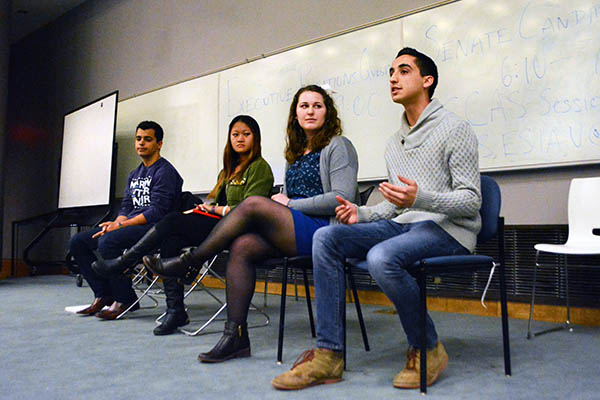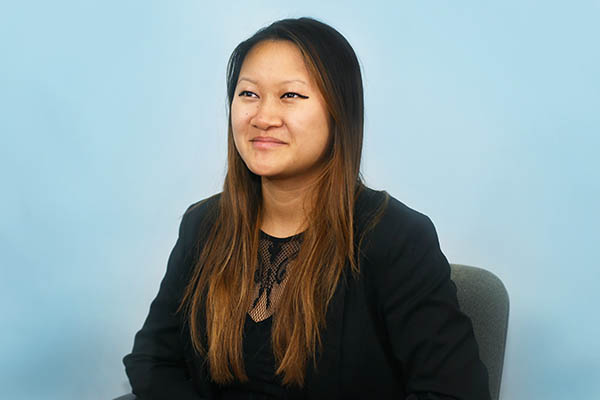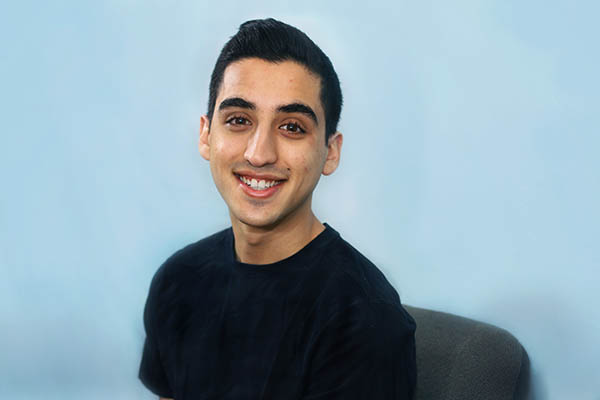Each of the four candidates running for top roles in the Student Association represent minority communities for the first time in recent years.
The candidacies represent a broader focus on diversity within the SA, and also come after a top student leader called on minority students to run for senate positions this year. Though officials have prioritized recruiting minority students, they have not always been represented on the SA and have felt they are part of groups that are underfunded.
SA presidential candidates Tony Hart and Christina Giordano, as well as executive vice presidential candidate Thomas Falcigno, represent racial minority groups, and Erika Feinman openly identifies as queer and is the first student with a non-binary gender identity to run for a top position in the SA.
Racial inclusion has been a conversation on campus all year, especially in light of national discussions of campus climate following protests this fall at the University of Missouri.
Associate Dean of Students Tim Miller said once senators are elected, the best ways for them to represent every population are to attend organizations’ events and to work with them throughout the year – not just during the elections and allocations processes. Miller has advised the SA for 12 of the last 14 years.
“Students can hold the SA more accountable throughout the year if they want to. That’s what you saw last Monday,” he said. “I think that’s the piece that’s missing, the students don’t actually say to the senate: ‘We want this from you.'”
Presenting their priorities
Hart, Falcigno and Feinman included diversity-related planks in their platforms and have said that representing minority groups may help them connect to broader swaths of students. Hart said he would push for renovations to the Multicultural Student Services Center, Falcigno said he would include minority students in meetings with administrators and Feinman said she would give minority groups a more official voice on the SA.
Each of the four candidates also attended a town hall-style event with the MSSC last Wednesday, which was meant for students interested in multicultural issues to learn more about how candidates will address them.
At the town hall, Giordano said she would encourage the senate and her cabinet to be “active participants” at multicultural events throughout the year.

“As a person of color, I find value in having somebody who looks like me being represented,” Giordano said.
The town hall occurred about one week after SA President Andie Dowd said her cabinet will receive diversity training for the first time this spring, after a disagreement over funding a South Asian heritage event left some students saying they feel disrespected by the SA.
All three presidential candidates said they supported mandatory diversity training for student leaders.
Candidates criticized how the SA handled the funding situation at the town hall. Falcigno said some of the comments by members of the SA were “totally unprofessional and discouraging.”
“The Student Association has done too much of saying, ‘Here’s what’s best for you,’ instead of asking students what’s best for them,” he said. “We need to do more listening instead of talking.”
Last year, half of the candidates for president and executive vice president were white male students. This year, roughly half of the candidates for senate positions represent minority communities. If those candidates win, they say it will change not only discourse within the senate, but also the decisions that are made.
Encouraging students to run
Sen. Melissa Lawrence, CCAS-U, said in an SA meeting last Monday that she was not running for a position in the SA this year partly because of the abundance of “micro- and macroaggressions” she experienced on the senate.
But she noted that having at least one person representing a multicultural community in the room while the finance committee debates, for example, makes a difference.
“I’ve seen amounts raised from $1,000 to $6,000 because I was a person of color arguing for it,” she said at the meeting last Monday.
A leader in the multicultural community is partly behind a more diverse candidate pool this year. Victoria Goncalves, the president of the Organization of Latino American Students and a former senator, sent an email last month to members of multicultural organizations encouraging them to run for senate positions. She also organized the town hall, where candidates made their case to minority students.
She said two years ago, the Organization of Latino American Students’ request for funds for a keynote speaker was denied during the allocations process.
“When we protested about this, we were told that it was because we didn’t have a contract yet – even though the GW College Democrats and the GW College Republicans each received over $30,000 for unknown speakers that weren’t booked yet,” she wrote in the email obtained by The Hatchet.
She said as a senator she advocated for multicultural students but “it wasn’t easy because most of the Student Association is not involved at all in our community and doesn’t understand it.”
Ivette Headley, a sophomore running for CCAS-U, said Goncalves played “an encouraging role in my decision to run.” Headley currently serves as the Internal Relations Chair of GW Por Colombia, an organization for Colombian students.
Headley said representation on the finance committee means approving programming that is essential to support all communities on campus. If elected, she hopes to either serve on the finance committee or work closely with it.
She said that outside of finance, minority representation on the senate would allow for a stronger push toward initiatives dealing with diversity and inclusion, affordability and community collaboration. Part of her campaign’s platform involves creating a mentorship program for incoming minority students.
The Center for Student Engagement established office hours for first-generation students, after discontinuing a peer mentor program for all freshmen in favor of focusing on specific groups of incoming freshmen.
“My hope is to promote awareness of the various communities through proportionate funding,” Headley said.
Equal allocations
Meera Devotta, a freshman and candidate for senator in the Elliott School of International Affairs, said that more representation brings a broader set of viewpoints to every issue, which ultimately affects decisions.
She said the SA’s roughly $1.2 million budget would be allocated more proportionately among smaller and larger groups on campus if the senate were more diverse.
“Money is seen as something that means the same to everyone, but that’s not true. A dollar to one person might mean something completely different to another person,” she said.
Students said as recently as last week that the spring allocations process, during which organizations apply for SA funding, often favors well-known and larger groups like College Democrats and leaves multicultural groups, which typically organize month-long heritage celebrations, to fundraise year-round.
Devotta, a member of the Women’s Leadership Program and of Delta Phi Epsilon, added that different perspectives would help solve that discrepancy.
Sen. Rayhaan Merani, a member of the finance committee, said the diversity and equity clause in the financial bylaws reform was largely a result of senators representing multicultural communities, like himself, Sen. Nick Watkins, CCAS-U, and Feinman. The clause allows for organizations representing historically marginalized communities to be more likely to receive funding, and gives priority to multicultural organizations to have funding access food for programming.
“Having multicultural representation on the senate is what changes everything up,” Merani said.
He said that despite allegations of aggressions, he would “highly recommend” that more students from marginalized communities run for the senate.
“The way you increase that awareness, the way you build those relationships, the way you teach people about your culture and about your heritage and the reason for diversity and equity is by running for the Senate,” Merani said.
Sera Royal and Andrew Goudsward contributed reporting.






